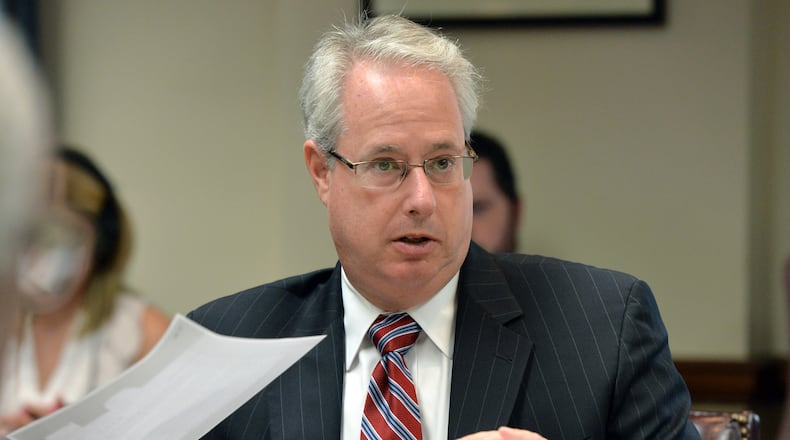The appointment of Attorney General Sam Olens as the next president of Kennesaw State University is now as close to a gimme putt as a gubernatorial endorsement can make it.
With Nathan Deal’s seal of approval, the Board of Regents – whose members are all appointed by the governor -- will take up the matter next week.
Olens’ selection would put an end to his 17-year GOP electoral career, slamming the lid on all speculation of a 2018 run for governor. At the same time, it would give Olens, 59, permanent standing in his beloved Cobb County community, shorten his daily commute considerably, and produce a significant increase in his take-home pay.
The attorney general’s current salary is almost $140,000 per annum. The 2016 pay package for Dan Papp, whom Olens would replace, was $362,740.
On the plus side of any debate over optics: Olens has a reputation for supporting open records and open government, even as booming Kennesaw State has gained notoriety as a place for financial hanky-panky.
Yet the faculty of KSU is upset that the regents didn’t even bother with the charade of a national search for a new president. Olens is the only candidate under consideration. And students are aghast that Olens, as a Republican attorney general, has enlisted the state’s legal machinery in Republican causes.
Georgia is among the states participating in a legal challenge to the Obama administration’s “guidelines” on gender identity in public schools, for instance. (Though to be fair, it was Olens, in anticipation of the 2015 decision by the U.S. Supreme Court that declared gay marriage a constitutional right, who warned against back-channel opposition – and helped ensure that Georgia didn’t go the way of Alabama and Kentucky.)
But objections to Olens’ appointment are likely to be quickly drowned out by the coming debate over his successor as the state’s lawyer.
The same voices who told us Olens was to be KSU’s next president now inform us that Governor Deal will appoint Chris Carr, who for the last three years has served as his commissioner of the Department of Economic Development, to fill out Olens’ term as attorney general.
Carr, a former chief of staff for U.S. Sen. Johnny Isakson, is bright and well-liked around the state Capitol. Carr has a law degree, which he placed in deep-freeze when he went to Washington for Isakson, but lacks courtroom experience.
Yet Carr, on the governor’s behalf, has handled many of the hush-hush negotiations that now accompany industry recruitment. And if there’s one thing to be learned from Deal’s six years as governor, it is that, when it comes to appointments, the governor values personal relationships over technical expertise.
Whether Carr or not, the governor’s appointment will sound off like a starting pistol. The attorney general is the second-most powerful executive position in state government – one that can challenge the authority of both the governor and the Legislature.
Olens’ replacement is almost sure to face opposition under one of three circumstances:
-- An ideological primary challenge that could quickly give voice to (win or lose) a post-Donald Trump debate over what it means to be a Republican. “I don’t believe Republican primary voters want constitutional officers picked by the executive branch,” said state Sen. Josh McKoon, a Columbus attorney who has crossed swords with the governor over “religious liberty” legislation. “I’d be stunned if the governor appoints someone to the position and that someone didn’t face a primary challenge.”
But McKoon says he wouldn’t make a call on becoming a part of that fight until next spring.
-- A fight among lawyers. A proposed constitutional amendment on the Nov. 8 ballot would do away with the current judicial watchdog organization, called the Judicial Qualifications Commission, and allow for the creation of a new one – that would enhance the influence of the Legislature over judicial behavior and greatly reduce the clout of the State Bar.
Whichever way the vote goes, a 2018 could be an extension of that feud. Lester Tate, a Cartersville attorney and former president of the State Bar, who quit the JQC in protest earlier this year, said it’s too early to rule the race in or out of his future. “I very definitely think that the job is one that requires a lawyer and not a politician,” said Tate, a man with Democratic leanings.
-- Which leads us to the third scenario. The 2018 election will determine who controls the redistricting that follows the all-important 2020 census. If Democrats can’t capture the Governor’s Mansion, the attorney general’s office may be the next best thing.
State Rep. Stacey Evans, D-Smyrna, might be interested in a general election fight. “I’m open to the idea. I think it’s a post where someone can be very effective,” she said this week – as she campaigned door-to-door for her House seat. But when we asked state Rep. Scott Holcomb, D-Atlanta, he dismissed the idea.
Holcomb didn’t say so, but here’s one thought he might have: Republicans often point to the 1994 election of Linda Schrenko as state school superintendent, a relatively obscure down-ballot office, as a key rung in their climb to power.
Some Georgia Democrats are skeptical that they could replicate that. The 1994 vote for Schrenko was part of a backlash against President Bill Clinton, a Democrat. If Hillary Clinton is in the White House in 2018, Republicans could have the upper hand in Georgia again – not Democrats.
However the case, the dominoes are about to begin falling.
About the Author
The Latest
Featured




